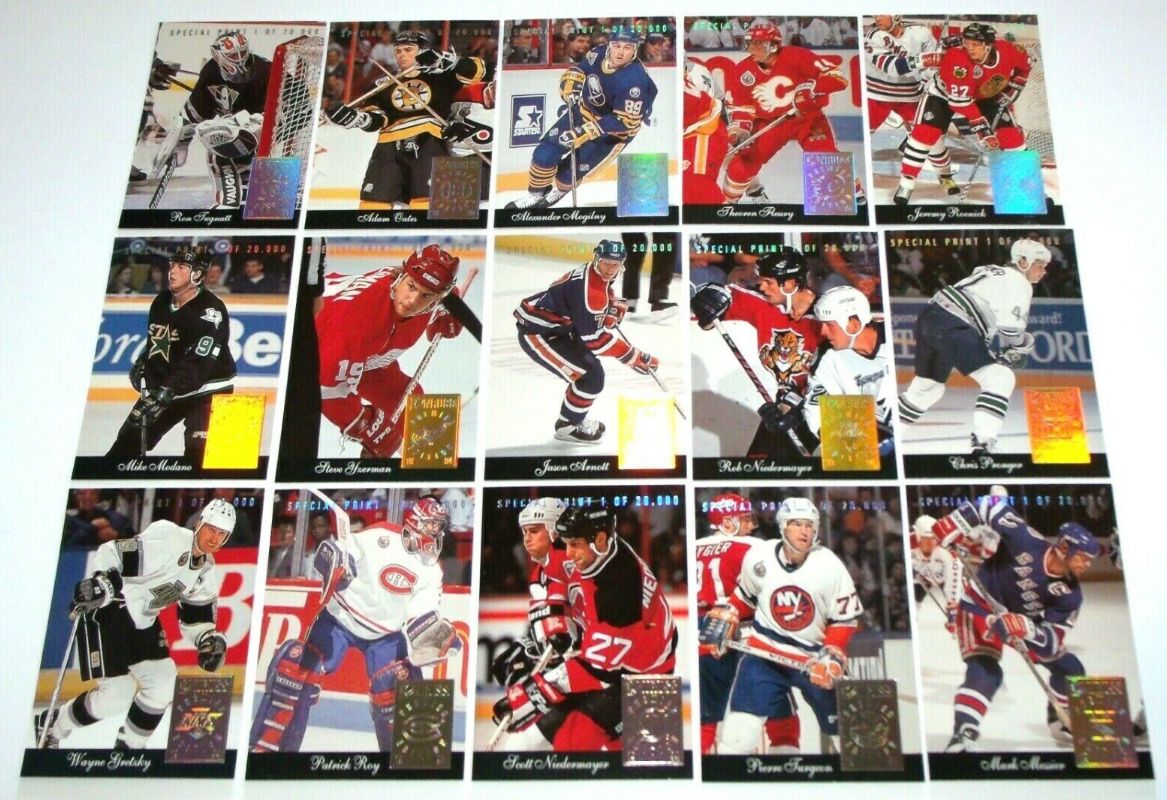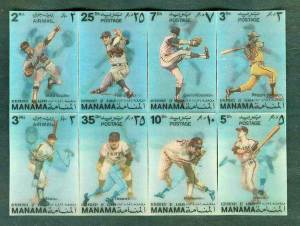1993-94 Donruss HKY - Premier Edition - Complete insert set (26 cards)
LIMITED EDITION with only 20,000 made of each card !!! Wayne Gretzky, Patrick Roy, Eric Lindros, Mario Lemeiux...
| Grade |
NEAR MINT to NM/MINT |
| Book Value |
n/a |
| Our Price |
$ 29.95
Add to cart
|


Below are short bits & pieces on sportscard & baseball trading card collecting.
Please wander around the website for more info, prices, values & images
on vintage baseball, football, basketball, hockey, sport and non-sports cards.
1972 Manama
Official Postage Stamps


These beautiful official government issued postage stamps from
Manama were made of a plastic like material and used a an advanced
printing technique to show multiple images as the card was moved.
This technique was later used on a baseball card issue called
"Sportflics".
Each of these postage stamps pictured 2 different players as the
stamp was titled. There were 8 different stamps issued, 4 with
American player-combos and 4 with Japanese player-combos.
A special stamp picturing BABE RUTH alongside the famous
Yankees "MURDERS ROW" was also issued and appears to be
significantly scarcer than the others.
For more info on all our postage stamp issues, click below:
1972 Manama Baseball Postage Stamps Checklist & Prices
|

1953 Topps Baseball Cards
Checklist & Values
The 1953 Topps set is a collection of gorgeous portraits drawn by the
leading sports artists of the day. Key cards in the 1953 Topps set
include: Jackie Robinson, Mickey Mantle, Willie Mays & Satchel Paige.
Satchel Paige had his name spelled incorrectly (2 'L') on the card front.
As with all Topps sets from the 1950's & 1960's, 1953 Topps was issued in
series, (#1-85, #86-165, #166-220 & #221-280) with the final series
"High Numbers" the least produced, least available and thus the most costly.
Topps and Bowman still at war likely accounts for the 6 missing #'s
from the High Number series.
Note: You may be on that page right now.
|

1955 Topps Double-Headers (Doubleheaders)
Baseball Cards Set checklist/info


Without a doubt my FAVORITE SET - PERIOD. Regular issue, test issues,
inserts ... whatever ... this is # 1 !!!
Similar to the early 1900's Mecca Double Folders, these colorful
2-1/16" x 4-7/8" cards are actually 2-cards-in-1 !
Perforated in the center, you can fold to create cards of 2
different players. Unperforated 1955 Topps DoubleHeaders exist.
 All 132 players (66 cards) in the 1955 Topps DoubleHeaders set were also in
the regular 1955 Topps set, with the same action image.
All 132 players (66 cards) in the 1955 Topps DoubleHeaders set were also in
the regular 1955 Topps set, with the same action image.
 NOTE: Laid side-by-side the cards form spectacular scenes
from actual stadiums !!!
NOTE: Laid side-by-side the cards form spectacular scenes
from actual stadiums !!!
Old-timers - can you identify the stadiums ?
ROOKIES:
Harmon Killebrew, Hal Newhouser
STARS:
Ted Williams, Hank Aaron, Jackie Robinson ...
The Best !!!
Click for complete
1955 Topps Double-Headers (Doubleheaders) baseball cards Checklist and Prices
Note: You may be on that page right now.
|

Are sports cards valuable ?
Like all collectibles, over time some sports cards go down in value,
others go up and some can even become very valuable.
Card values are based on many factors:
player popularity, scarcity, condition & collector interest.
A card can be scarce but without demand value may not be great.
Q: What are some ways to collect cards ?
* Complete sets by year & issue
* Cards of your favorite player
* Cards of your favorite team "TEAM SETS"
* Rookie cards
* Hall-of-Famer cards
* I even had a girlfriend that collected Don Mossi (checkout his ears),
players whose last name start with "Z", and the Brett brothers George &
Ken (she had a crush on George).
* "TYPE COLLECTING" (everyone should at least do a little of this !)
"Type Collecting"
is collecting at least one of each different "type" of issue.
On scarcer issues you can add a less expensive common
while on others you can select your favorite player or team.








 Without a doubt my FAVORITE SET - PERIOD. Regular issue, test issues,
inserts ... whatever ... this is # 1 !!!
Without a doubt my FAVORITE SET - PERIOD. Regular issue, test issues,
inserts ... whatever ... this is # 1 !!!  All 132 players (66 cards) in the 1955 Topps DoubleHeaders set were also in
the regular 1955 Topps set, with the same action image.
All 132 players (66 cards) in the 1955 Topps DoubleHeaders set were also in
the regular 1955 Topps set, with the same action image.
 NOTE: Laid side-by-side the cards form spectacular scenes
from actual stadiums !!!
NOTE: Laid side-by-side the cards form spectacular scenes
from actual stadiums !!! 